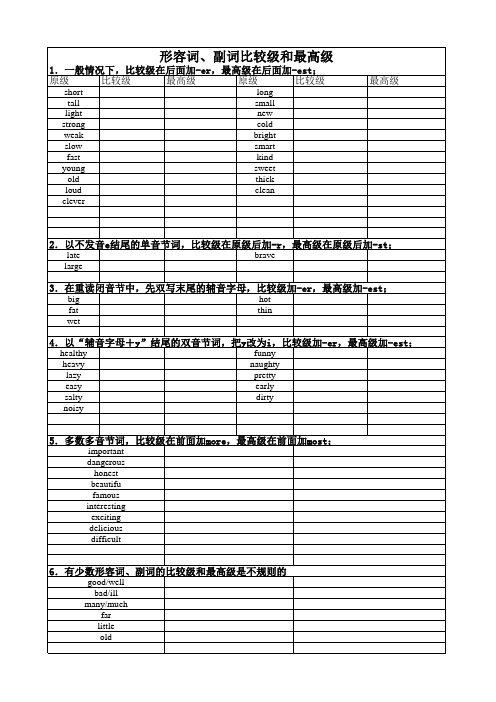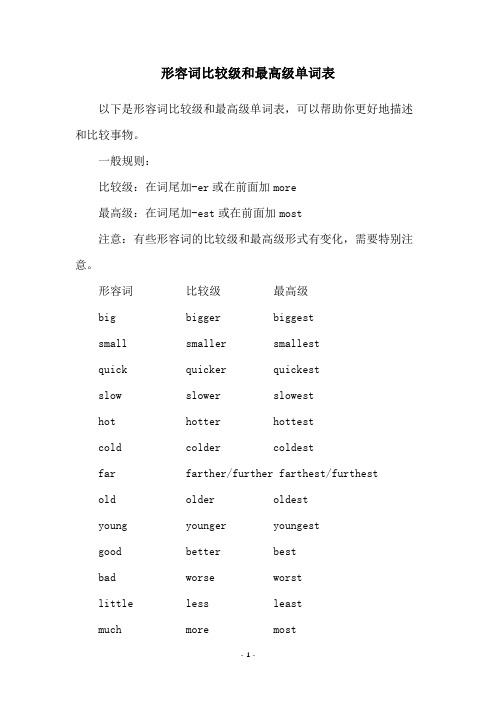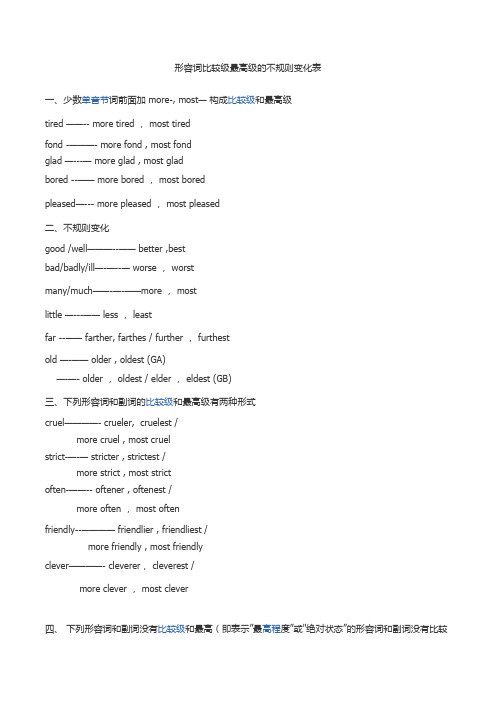比较级和最高级表格
比较级最高级表格

1.一般情况下,比较级在后面加-er,最高级在后面加-est; 原级 比较级 最高级 原级 比较级
short tall light strong weak slow fast young old loud clever long small new cold bright smart kind sweet thick clean
4.以“辅音字母+y”结尾的双音节词,把y改为i,比较级加-er,最高级加-est;
funny naughty pretty early dirty
5.多数多音节词,比较级在前面加more,最高级在前面加most;
important dangerous honest beautifu famous interesting exciting delicious difficult
最高级
2.以不发音e结尾的单音节词,比较级在原级后加-r,最高级在原级后加-st;
late large big fat wet healthy heavy lazy easy salty noisy brave
3.在重读闭音节中,先双写末尾的辅音字母,比较级加-er,最高级加-est;
hot thin
6.有少数形容词、副词的比较级和最高级是不规则的
good/well bad/ill many/muc
初中比较级和最高级的单词表

比较级和最高级的练习表1.在形容词词尾加上 “er” “est” 构成比较级、最高级:bright(明亮的)—brighter—brightest broad(广阔的)—broader—broadest cheap(便宜的)—cheaper—cheapest clean(干净的)—cleaner—cleanest clever(聪明的)—cleverer—cleverest cold(寒冷的)—colder—coldestcool(凉的)—cooler—coolestdark(黑暗的)—darker—darkest dear(贵的)—dearer—dearestdeep(深的)—deeper—deepestfast(迅速的)—faster—fastestfew(少的)—fewer—fewestgreat(伟大的)—greater—greatest hard(困难的,硬的)—harder—hardest high(高的)—higher—highestkind(善良的)—kinder—kindest light(轻的)—lighter—lightestlong(长的)—longer—longestloud(响亮的)—louder—loudest low(低的)—lower—lowestnear(近的)—nearer—nearestnew(新的)—newer—newestpoor(穷的)—poorer—poorestquick(快的)—quicker—quickest quiet(安静的)—quieter—quietest rich(富裕的)—richer—richestshort(短的)—shorter—shortestslow(慢的)—slower—slowest small(小的)—smaller—smallest smart(聪明的)—smarter—smartest soft(柔软的)—softer—softest strong(强壮的)—stronger—strongest sweet(甜的)—sweeter—sweetesttall(高的)-taller-tallestthick(厚的)—thicker—thickest warm(温暖的)—warmer—warmest weak(弱的)—weaker—weakest young(年轻的)—younger—youngest2.双写最后一个字母,再加上 “er” “est”构成比较级、最高级:big(大的)—bigger—biggest fat(胖的)—fatter—fattest hot(热的)—hotter—hottest red(红的)—redder—reddest sad(伤心的)—sadder—saddest thin(瘦的)—thinner—thinnest wet(湿的)—wetter—wettest mad(疯的)—madder—maddest3.以不发音的字母e结尾的形容词,加上 “r” “st” 构成比较级、最高级:able(能干的)—abler—ablest brave(勇敢的)—braver—bravest close(接近的)—closer—closest fine(好的,完美的)—finer—finest large(巨大的)—larger—largest late(迟的)—later—latestnice(好的)—nicer—nicest ripe(成熟的)—riper—ripestrude(粗鲁的)—ruder—rudestsafe(安全的)—safer—safest strange(奇怪的)—stranger—strangest wide(宽广的)—wider—widestwise(睿智的,聪明的)—wiser—wisest white(白的)—whiter—whitest4.以字母y结尾的形容词,把y改为i,再加上 “er”“est”构成比较级、最高级:busy(忙碌的)—busier—busiestdirty(脏的)—dirtier—dirtiestdry(干燥的)—drier—driestearly(早的)—earlier—earliesteasy(容易的)—easier—easiestfriendly(友好的)—friendlier—friendliest funny(好玩的)—funnier—funniest happy(开心的)—happier—happiest healthy(健康的)—healthier—healthiest heavy(重的)—heavier—heaviest hungry(饿的)—hungrier—hungriestlazy(懒惰的)—lazier—laziestlucky(幸运的)—luckier—luckiestnaughty(调皮的)—naughtier—naughties tnoisy(嘈杂的)—noisier—noisiestpretty(美丽的)—prettier—prettiestsilly(傻的)—sillier—silliestspicy(辣的)—spicier—spiciestthirsty(渴的)—thirstier—thirstiestugly(丑的)—uglier—ugliest5.双音节、多音节形容词,在单词前面加上 “more”“most”构成比较级、最高级:afraid(害怕的)—more afraid—most afraidbeautiful(美丽的)—more beautiful—most beautifulcareful(仔细的)—more careful—most carefulcheerful(开心的)—more cheerful—most cheerfulcrowded(拥挤的)—more crowded—most crowdeddangerous(危险的)—more dangerous—most dangerousdelicious(美味的)—more delicious—most deliciousdifficult(困难的)—more difficult—most difficultexciting(令人兴奋的)—more exciting—most excitingexpensive(昂贵的)—more expensive—most expensivefamous(著名的)—more famous—most famousfrightened(受惊的)—more frightened—most frightenedfrightening(令人害怕的)—more frightening—most frighteninghard-working(勤奋的)—more hard-working—most hard-workinghelpful(有帮助的)—more helpful—most helpfulhonest(诚实的)—more honest—most honestimportant(重要的)—more important—most importantinteresting(有趣的)—more interesting—most interestingpolite(有礼貌的)—more polite—most politeterrible(可怕的)—more terrible—most terribletired(累的)—more tired—most tired6.不规则变化的形容词:bad(坏的)—worse—worst far(远的)—farther—farthest (far—further—furthest) good(好的)—better—best ill(病的)—worse—worst little(少的)—less—leastmany(多的)—more—most much(多的)—more—most old(年老的)—older—oldest(old—elder—eldest)well(好的,身体好的)—better—best精品文档word文档可以编辑!谢谢下载!。
形容词比较级和最高级单词表

形容词比较级和最高级单词表以下是形容词比较级和最高级单词表,可以帮助你更好地描述和比较事物。
一般规则:比较级:在词尾加-er或在前面加more最高级:在词尾加-est或在前面加most注意:有些形容词的比较级和最高级形式有变化,需要特别注意。
形容词比较级最高级big bigger biggestsmall smaller smallestquick quicker quickestslow slower slowesthot hotter hottestcold colder coldestfar farther/further farthest/furthestold older oldestyoung younger youngestgood better bestbad worse worstlittle less leastmuch more mostmany more mostfew fewer fewestnear nearer nearestlate later latest/lastearly earlier earliest/first 此外,还有一些特定形容词的比较级和最高级形式需要牢记:形容词比较级最高级good-looking better-looking best-lookingbad-tempered worse-tempered worst-temperedwell-behaved better-behaved best-behavedwell-known better-known best-knownmuch/many more mostlittle less leastfar farther/further farthest/furthestold elder eldestyoung junior juniormostold-fashioned more old-fashioned most old-fashioned pretty prettier prettiestugly uglier ugliestheavy heavier heaviestlight lighter lightestthick thicker thickestthin thinner thinnestlong longer longestshort shorter shortest以上就是形容词比较级和最高级单词表,希望能对你的英语学习有所帮助。
比较级和最高级列表

比较级和最高级列表good-better-best new—newer—newestbad/ill-worse-worstfar-farther—farthestfar-further-furthestmany/much-more-most little—less-leastlong-longer-longestyoung-younger-youngest old-older/elder-oldest/eldest short—shorter-shortest high—higher—highest deep—deeper-deepest small—smaller—smallest big—bigger-biggest tall—taller—tallestloud-louder—loudestlow-lower-lowestthin-thiner—thinestfat-fatter-fattestgreat-greater-greatest nice—nicer-nicest happy—happier-happiestheavy-heavier-heaviestcheap-cheaper-cheapest near—nearer—nearestclean-dleaner-cleanestfew-fewer—fewestlate-later-latest angry—angrier—angriestbusy-busier-busiest lazy—lazier—laziesthot-hotter—hottest glad—gladder—gladdest clear—clearer—cleareststrong-stronger—strongest lucky—luckier—luckiest interesting—more interesting —most interesting difficult—more difficult-most difficult expensive-more expensive—most expensive形容词比较级、最高级的构成一、规则变化1。
形容词比较级最高级不规则变化表

形容词比较级最高级的不规则变化表一、少数单音节词前面加 more-, most—构成比较级和最高级tired ——-- more tired , most tiredfond -———- more fond , most fondglad —---— more glad , most gladbored --—— more bored , most boredpleased—--- more pleased , most pleased二、不规则变化good /well———--—— better ,bestbad/badly/ill—-—--— worse , worstmany/much——-—-——more , mostlittle —---—— less , leastfar --—— farther, farthes / further , furthestold —-—— older , oldest (GA)—-—- older , oldest / elder , eldest (GB)三、下列形容词和副词的比较级和最高级有两种形式cruel————- crueler, cruelest /more cruel , most cruelstrict-—-— stricter , strictest /more strict , most strictoften-——-- oftener , oftenest /more often , most oftenfriendly--———— friendlier , friendliest /more friendly , most friendlyclever————- cleverer, cleverest /more clever , most clever四、下列形容词和副词没有比较级和最高(即表示”最高程度”或"绝对状态”的形容词和副词没有比较级和最高级)empty , wrong , perfect , unique , extreme , excellent , favourite (GB)/ favorite (GA) , true ,right , correct , extremely ..。
英语常见形容词及比较级、最高级变化一览表格模板

英语常见形容词及比较级、最高级变化一览表1.在形容词词尾加上“er” “est” 构成比较级、最高级:bright(明亮的)—brighter—brightest broad(广阔的)—broader—broadestcheap(便宜的)—cheaper—cheapest clean(干净的)—cleaner—cleanest clever(聪明的)—cleverer—cleverest cold(寒冷的)—colder—coldest cool(凉的)—cooler—coolest dark(黑暗的)—darker—darkest dear(贵的)—dearer—dearest deep(深的)—deeper—deepest fast(迅速的)—faster—fastest few(少的)—fewer—fewest great(伟大的)—greater—greatest hard(困难的,硬的)—harder—hardesthigh(高的)—higher—highest kind(善良的)—kinder—kindest light(轻的)—lighter—lightest long(长的)—longer—longest loud(响亮的)—louder—loudest low(低的)—lower—lowest near(近的)—nearer—nearest new(新的)—newer—newest poor(穷的)—poorer—poorest quick(快的)—quicker—quickest quiet(安静的)—quieter—quietest rich(富裕的)—richer—richest short(短的)—shorter—shortest slow(慢的)—slower—slowest small(小的)—smaller—smallest smart(聪明的)—smarter—smartestsoft(柔软的)—softer—softest strong(强壮的)—stronger—strongestsweet(甜的)—sweeter—sweetest tall(高的)-taller-tallest thick(厚的)—thicker—thickest warm(温暖的)—warmer—warmest weak(弱的)—weaker—weakest young(年轻的)—younger—youngest2.双写最后一个字母,再加上“er” “est” 构成比较级、最高级:big(大的)—bigger—biggest fat(胖的)—fatter—fattesthot(热的)—hotter—hottest red(红的)—redder—reddest sad(伤心的)—sadder—saddest thin(瘦的)—thinner—thinnest wet(湿的)—wetter—wettest mad(疯的)—madder—maddest3.以不发音的字母e结尾的形容词,加上“r” “st” 构成比较级、最高级:able(能干的)—abler—ablest brave(勇敢的)—braver—bravest close(接近的)—closer—closest fine(好的,完美的)—finer—finest large(巨大的)—larger—largest late(迟的)—later—latest nice(好的)—nicer—nicest ripe(成熟的)—riper—ripest rude(粗鲁的)—ruder—rudest safe(安全的)—safer—safest strange(奇怪的)—stranger—strangest wide(宽广的)—wider—widest wise(睿智的,聪明的)—wiser—wisest white(白的)—whiter—whitest4.以字母y结尾的形容词,把y改为i,再加上“er” “est” 构成比较级、最高级:busy(忙碌的)—busier—busiest dirty(脏的)—dirtier—dirtiest dry(干燥的)—drier—driest early(早的)—earlier—earliest easy(容易的)—easier—easiest friendly(友好的)—friendlier—friendliestfunny(好玩的)—funnier—funniest happy(开心的)—happier—happiesthealthy(健康的)—healthier—healthiest heavy(重的)—heavier—heaviest hungry(饿的)—hungrier—hungriest lazy(懒惰的)—lazier—laziest lucky(幸运的)—luckier—luckiest naughty(调皮的)—naughtier—naughtiestnoisy(嘈杂的)—noisier—noisiest pretty(美丽的)—prettier—prettiest silly(傻的)—sillier—silliest spicy(辣的)—spicier—spiciest thirsty(渴的)—thirstier—thirstiest ugly(丑的)—uglier—ugliest 5.双音节、多音节形容词,在单词前面加上“more” “most” 构成比较级、最高级:afraid(害怕的)—more afraid—most afraidbeautiful(美丽的)—more beautiful—most beautifulcareful(仔细的)—more careful—most carefulcheerful(开心的)—more cheerful—most cheerfulcrowded(拥挤的)—more crowded—most crowdeddangerous(危险的)—more dangerous—most dangerousdelicious(美味的)—more delicious—most deliciousdifficult(困难的)—more difficult—most difficultexciting(令人兴奋的)—more exciting—most excitingexpensive(昂贵的)—more expensive—most expensivefamous(著名的)—more famous—most famousfrightened(受惊的)—more frightened—most frightenedfrightening(令人害怕的)—more frightening—most frighteninghard-working(勤奋的)—more hard-working—most hard-workinghelpful(有帮助的)—more helpful—most helpfulhonest(诚实的)—more honest—most honestimportant(重要的)—more important—most importantinteresting(有趣的)—more interesting—most interestingpolite(有礼貌的)—more polite—most politeterrible(可怕的)—more terrible—most terribletired(累的)—more tired—most tired6.不规则变化的形容词:bad(坏的)—worse—worstfar(远的)—farther—farthest (far—further—furthest)good(好的)—better—bestill(病的)—worse—worstlittle(少的)—less—leastmany(多的)—more—mostmuch(多的)—more—mostold(年老的)—older—oldest ( old—elder—eldest)well(好的,身体好的)—better—best形容词的比较级和最高级: 形容词的比较级和最高级形式是在形容词的原级形式的基础上变化的。
(完整版)最全表格形式形容词和副词比较级和最高级
加-er,-est
clever→cleverer→cleverest
narrow→narrower→narrowest
6其他双音节词(副词)和多音节词,
比较级在前面加more,最高级在前面加most
beautiful→more beautiful→most beautiful
形容词和副词的比较级和最高级的变化规则
一形容词、副词的比较级和最高级的构成规则:
1一般情况
加-er,-est
tall→taller→tallestgreat→greater→greatest
2以不发音e结尾的单音节词
加-r,-st
large→larger→largestnice→nicer→nicest
Tom is as old as Kate.汤姆和凯特年龄一样大。
Tom is twice as old as Kate.汤姆的年龄是凯特的二倍。
2“甲+实意动词+(倍数)+as+副词原级+as+乙”表示“甲和乙程度相同”或“甲是乙的几倍”
Tom runs as fast as Mike.汤姆和迈克跑得一样快。Tom runs twice as fast as Mike.汤姆跑得速度是迈克的二倍。
3“甲+be+形容词比较级+than+any other+单数名词(+介词短语)”表示“甲比同一范围的任何一个人/物都……”,含义是“甲最……”。
注意:The Yangtze Riveris longer than any river in Japan.长江比日本的任何一条河都长。
The Yangtze River is longer than any other river in China. =The Yangtze River is longer than any of the other rivers in China.长江比中国的任何一条其他的河都长。
(完整版)最全表格形式形容词和副词比较级和最高级
结构
可放在前的修饰词
例句
二、比较级的用法
1甲+be+(倍数)+形容词比较级+than+乙”表示“甲比乙…”或“甲比乙…几倍”
a lot, much , a bit, even, a little , still, far,
Lesson One is much easier than Lesson Two.第一课比第二课容易得多。
3“甲+be+not+as/so+形容词原级+as+乙”甲不如乙…
This room is not as/so big as that one.这个房间不如那个大。
4甲+助动词+not+动词原形+as/so+副词原级+as+乙”甲不如乙…
He doesn’t walk as slowly as you.他走路不像你那样慢。
2“甲+实意动词+(倍数)+副词比较级+than+乙”表示“甲比乙…”或“甲比乙…几倍”
I got up earlier than my mother this morning.我今天早晨起床比我妈妈还早。
He runs three times faster than his her.他跑的速度比他弟弟快三倍。
3“甲+be+形容词比较级+than+any other+单数名词(+介词短语)”表示“甲比同一范围的任何一个人/物都……”,含义是“甲最……”。
注意:The Yangtze Riveris longer than any river in Japan.长江比日本的任何一条河都长。
英语常见形容词及比较级最高级变化一览表
形容词第一章比较级、最高级变化一览表规则变化1.单音节以及少数双音节的词尾加上“er”“est”构成比较级、最高级:bright明亮的—brighter—brightest broad广阔的—broader—broadestcheap便宜的—cheaper—cheapest clean干净的—cleaner—cleanest clever聪明的—cleverer—cleverest cold寒冷的—colder—coldestcool凉的—cooler—coolest dark黑暗的—darker—darkestdear贵的—dearer—dearest deep深的—deeper—deepestfast迅速的—faster—fastest few少的—fewer—fewestgreat伟大的—greater—greatest hard困难的,硬的—harder—hardesthigh高的—higher—highest kind善良的—kinder—kindestlight轻的—lighter—lightest long长的—longer—longestloud响亮的—louder—loudest low低的—lower—lowestnear近的—nearer—nearest new新的—newer—newestpoor穷的—poorer—poorest quick快的—quicker—quickestquiet安静的—quieter—quietest rich富裕的—richer—richestshort短的—shorter—shortest slow慢的—slower—slowestsmall小的—smaller—smallest smart聪明的—smarter—smartestsoft柔软的—softer—softest strong强壮的—stronger—strongest sweet甜的—sweeter—sweetest tall高的-taller - tallest thick厚的—thicker—thickest warm温暖的—warmer—warmestweak弱的—weaker—weakest young年轻的—younger—youngest2以一个元音加一个辅音字母结尾的单音节词即重读闭音节词,双写结尾的辅音字母er,-estbig大的—bigger—biggest fat胖的—fatter—fattesthot热的—hotter—hottest red红的—redder—reddestsad伤心的—sadder—saddest thin瘦的—thinner—thinnestwet湿的—wetter—wettest mad疯的—madder—maddest特别提醒:new, few, slow, clean等词含有字母组合,且发的是长元音,不用双写;3.以不发音的字母e结尾的形容词,加上“r”“st”构成比较级、最高级:able能干的—abler—ablest brave勇敢的—braver—bravestclose接近的—closer—closest fine好的,完美的—finer—finestlarge巨大的—larger—largest late迟的—later—latest nice好的—nicer—nicest ripe成熟的—riper—ripestrude粗鲁的—ruder—rudest safe安全的—safer—safest strange奇怪的—stranger—strangest wide宽广的—wider—widestwise睿智的,聪明的—wiser—wisest white白的—whiter—whitest4.“以辅音字母+y”结尾的词改y为i,再加-er, -estbusy忙碌的—busier—busiest dirty脏的—dirtier—dirtiest dry干燥的—drier—driest early早的—earlier—earliesteasy容易的—easier—easiest friendly友好的—friendlier—friendliest funny好玩的—funnier—funniest happy开心的—happier—happiest healthy健康的—healthier—healthiest heavy重的—heavier—heaviest hungry饿的—hungrier—hungriest lazy懒惰的—lazier—laziestlucky幸运的—luckier—luckiest naughty调皮的—naughtier—naughtiest noisy嘈杂的—noisier—noisiest pretty美丽的—prettier—prettiestsilly傻的—sillier—silliest spicy辣的—spicier—spiciest thirsty渴的—thirstier—thirstiest ugly丑的—uglier—ugliest5.双音节、多音节形容词即音标中含有三个或三个以上元音音素的词,在单词前面加上“more”“most”构成比较级、最高级:afraid害怕的—more afraid—most afraidbeautiful美丽的—more beautiful—most beautifulcareful仔细的—more careful—most carefulcheerful开心的—more cheerful—most cheerfulcrowded拥挤的—more crowded—most crowdeddangerous危险的—more dangerous—most dangerousdelicious美味的—more delicious—most deliciousdifficult困难的—more difficult—most difficultexciting令人兴奋的—more exciting—most excitingexpensive昂贵的—more expensive—most expensivefamous着名的—more famous—most famousfrightened受惊的—more frightened—most frightenedfrightening令人害怕的—more frightening—most frighteninghard-working勤奋的—more hard-working—most hard-workinghelpful有帮助的—more helpful—most helpfulhonest诚实的—more honest—most honestimportant重要的—more important—most importantinteresting有趣的—more interesting—most interestingpolite有礼貌的—more polite—most politeterrible可怕的—more terrible—most terribletired累的—more tired—most tired特别提醒:以形容前缀un构成的三音节形容词不适合上述情况,如:unhappy-unhappier-unhappiest, untidy-untidier-untidiest6. 以形容词+ly构成的副词要在前面加 more,mostSlowly-more slowly-most slowly quickly-more quickly-most quickly特别提醒:early -earlier-earliest7. 由ing分词和-ed分词演变过来的形容词包括不规则动词如know→known只能加more或most来表示它们的比较级和最高级;interesting- more interesting -most interestingexcited- more excited- most excitingtired- more tired - mosttiredboring-more boring-most boring不规则变化bad坏的—worse—worstfar远的—farther—farthest far—further—furthestgood好的—better—bestill病的—worse—worstlittle少的—less—leastmany多的—more—mostmuch多的—more—mostold年老的—older—oldest old—elder—eldestwell好的,身体好的—better—best特别提醒:◇further不仅可以指“距离更远”,还可指“程度更深”;记住以下三个词组:further study 进修further education继续教育further information 进一步的信息◇elder仅用于同辈之间的排行,如: elder sister姐姐 elder brother 哥哥◇less作为“更少”仅用来修饰不可数名词,修饰可数名词表示“更少”要用fewer;第二章形容词副词比较级较难考点◇少数单音节词前面加 more, most 构成比较级和最高级,这类形容词一般为表语形容词和由过去分词变成的形容词afraid -more afraid, most afraid tired - more tired , most tiredfond - more fond , most fond glad -more glad , most gladbored - more bored , most bored pleased---- more pleased , most pleased ◇下列形容词和副词的比较级和最高级有两种形式,即:既可加-er/-est也可加more/most strict, often, friendly, clever◇下列形容词和副词没有比较级和最高即表示“最高程度”或“绝对状态”的形容词和副词没有比较级和最高级如:empty, wrong, perfect, unique, extreme, excellent, favourite, true, right, correct, extremely ...◇比较应在同类事物之间进行;误:Your English is better than me.正:Your English is better than mine.◇比较级前可以有一个表示程度的状语,最常见的三大修饰词是:a little, much, even; 以下单词也可用来修饰:any, far, still, a lot, yet, rather;My sister is a little taller than me.Their house is much larger than ours.另外,名词短语也可修饰比较级,说明程度;I’m three years older than he.特别提醒:very, quite, too不可修饰比较级;◇避免重复使用比较级;误:He is more kinder to small animals than I.正:He is much kinder to small animals than I.误:He is more cleverer than his brother.正:He is cleverer than his brother.◇比较要符合逻辑,在同一范围内比较时,避免将主语含在比较对象中,这时需使用other来排除自身;误:China is larger that any country in Asia.正:China is larger than any other country in Asia.误:John studies harder than any student in his class.正:John studies harder than any other student in his class.正:John studies harder than any of the other students in his class.正:John studies harder than anyone else in his class.◇比较要遵循前后一致的原则,注意前后呼应;The population of Shanghai is larger than that of Beijing.It is easier to make a plan than to carry it out.◇序数词通常只修饰最高级;Africa is the second largest continent.The Yellow River is the second longest river in China.This is the third most popular song of Michael Jackson.◇为避免重复,我们通常用that, those, one, ones代替前面出现的名词;that代替可数名词单数和不可数名词,those代替可数名词复数;one既可指人又可指物,只能代替可数名词; The weather in China is different from that in America.The book on the table is more interesting than that或the oneon the desk.A box made of steel is stronger than one made of wood.误:In winter, the weather of Beijing is colder than it of Shanghai.正:In winter, the weather of Beijing is colder than that of Shanghai.◇“否定词 + 比较级”相当于最高级;----Wait until we get a satisfactory reply, will you----I couldn't agree more. The idea sounds great to me.Nothing is so easy as this. =Nothing is easier than this. =This is the easiest thing. ◇比较级前一般不加冠词;但表示两者中较突出者,且比较级后又有名词或出现了of the two,这时比较级前一定要加the;He is the taller of the two.Of the two jobs,he chose the harder.Which is the younger one, Lily or Lucy试比较:Which is larger, Canada or AustraliaWhich is the larger country, Canada or AustraliaShe is taller than her two sisters.She is the taller of the two sisters.◇不含than 的比较级前可加不定冠词修饰,构成“a/an+比较级+单数可数名词”表示“一个更……的人/物”;Why don’t you use a sharper knife 你为什么不用一把更锋利的刀呢◇比较级than 后应用人称代词的主格,但非正式语体中常用宾格;He is taller than I/me.◇为避免重复,比较级中同样的动词用助动词do, does, did替代;I spend less time doing homework than John does.She tells more funny jokes than we do.以下内容不是初中教学的重点,仅供拓展之用;◇形容词most前面没有the,不表示最高级的含义,只表示“非常”;It is a most important problem.=It is a very important problem.◇倍数表达法▲A is threefour, etc.times the sizeheight, length etc.of B.The new building is four times the sizethe heightof the old one.这座新楼是那座旧楼的四倍大高/这座新楼比那座旧楼大高三倍;▲A is threefour, etc.times as bighigh, long, etc.as B.Asia is four times as large as Europe. 亚洲是欧洲的四倍大/亚洲比欧洲大三倍;▲A is three four, etc.times biggerhigher, longer, etc.than B.Your school is three times bigger than ours.你们的学校比我们的学校大三倍;用times 表倍数通常用于三倍以上,两倍可以用twice或double.第三章形容词副词比较级最高级重点句型归纳◇句型一:形容词或副词比较级+than…□注意事项:该句型为比较级的最基本句型;只要看到than,即可确定前面使用比较级;He is taller than I am.The boy does his homework more carefully than the girl.◇句型二:less + 形容词的原级 + than□注意事项:该句型表示“不如、不及”,特别需要注意的是,less本身就是little的比较级,后面必须跟形容词的原级,否定就造成了比较级的重复使用;This computer is less expensive than that one.◇句型三:as +形容词或副词的原级+ as□注意事项:该句型表示对比的两者程度相当,as之间必须跟形容词或副词的原级,决不能使用比较级;此外,还要确定使用形容词还是副词;确定的依据就是根据第一个as前的动词,如果是系动词如be,感官动词look, sound, smell, taste, feel等,那么就用形容词的原级,如果前面的动词是一般的实义动词,那么就必须用副词的原级修饰动词;This lesson is as easy as that one.Lucy talks with old people as politely as her sister.特别提醒:as…as之间也可以跟名词,句型如下:☆as +形容词+ a/an +单数名词+asHe is as kind a person as his father. 他和他爸爸一样都是善良的人;☆as + many/much+不可数名词/可数名词复数+asI can carry as much paper as you can. 你能搬多少纸,我也能;I have as many books as you do. 我的书和你的一样多;We’ll give you as much help as we can. 我们将尽我们所能给你帮助;其它几个关于as…as的句型:☆as … as one can:尽其所能He began to run as fast as he could.☆as … as possible:尽可能Please helpusas quickly as possible.☆as soon as…一……就……He will call me as soon as he comes here.◇句型四:not as/so +形容词或副词的原级+ as□注意事项:该句型表示“前者不如后者……”,往往可以与句型一和句型二替换;第一个as可以换为so; This classroom is not as bright as yours.I cannot run as fast as you.◇句型五:the +形容词或副词最高级+ in / of / among +比较范围□注意事项:如果这里为副词最高级,前面的the常常省略;介词in和of的用法完全不一样;in表示“在某一范围内”,如:in the classroom,in the world;of表示“在同类之间”,of后面的词与主语同类,另名词前一般有冠词the;among表示“在三者或三者以上之间”,among后接代词或没有修饰语的名词;The Changjiang River is the longest river in our country.Peter is the tallest of the six students.This picture is the most beautiful among these.◇句型六:one of + 形容词最高级+可数名词复数形式□注意事项:one of有三大考点:1. 后跟形容词最高级;2. 后接可数名词复数形式;3. 作主语时主语为one,谓语动词用单数形式;One of the smallest dinosaurs was about one metre long.◇句型七:比较级+and +比较级 / more and more +多音节词的原级□注意事项:该句型表示“越来越……”,如果该形容词比较级构成形式加er,则用前面的句型;如果该形容词比较级加more构成,则用后面的句型;It is getting hotter and hotter.The girl is becoming more and more beautiful.◇句型八:the +比较级+…, the +比较级+…□注意事项:该句型意思为“越……就越……”,表示两种情况同时变化;The more you eat, the fatter you will be.In the test, the more careful you are, the fewer mistakes you will make.◇句型九:be different from□注意事项:该句型没有运用比较级,但也是对两者事物进行比较;注意前后比较需在同类事物中进行; My schoolbag is different from yours.◇句型十:the same as… / the same…as…□注意事项:该句型同样没有运用比较级,表示两者之间具有共同特性;注意这里的as和same为固定搭配,不能随便变换;I don’t want to buy the same things as Amy did.◇句型十一:比较级+than + any other +名词单数形式□注意事项:any other 后面跟单数名词,表示“任何别的”,即主语在范围内,必须把自身从这一范围内除去,否则逻辑上不通;如果主语不在这一范围内,那么要把other去掉,只用any即可; Shanghai is larger than any other city in China.上海在中国这个范围内,所以用any otherShanghai is larger than any city in Jiangsu. 上海不在江苏,所以只需用any◇句型十二:比较级+than + the other +名词复数形式□注意事项:该句型相当于any other +名词单数形式,常用来进行同义句改写;该句型与句型十一虽然波表面上都是比较级,但实际上相当于最高级;以下三句表达的是同一个意思;Daniel is the most hard-working student in our class.Daniel is more hard-working than any other student in our class.Daniel is more hard-working than the other students in our class.特别提醒:表示两者人或物比较时,比较的对象应是同类事物,不同类的事物之间无法进行比较;。
最全表格形式形容词和副词比较级和最高级
8“特殊疑问词+be+形容词比较级,甲or乙”
Which is bigger,the earth or the moon
“特殊疑问词+实意动词+副词比较级,甲or乙”
unhappy—more unhappy, lucky-luckier
unlucky—more unlucky
注:最高级前要加the ,不加表示“非常”,a most important meeting
副词的比较级和最高级1.大多数以ly结尾的副词前加more 和most 来构成比较级和最高级。
2.少数单音节副词,加er,est 构成其比较级和最高级 。
形容词和副词的比较级和最高级的变化规则
一形容词、副词的比较级和最高级的构成规则:
1一般情况
加-reater→greatest
2以不发音e结尾的单音节词
加-r, -st
large→larger→largestnice→nicer→nicest
Mike gets to school earlier than any other student in his class.= Mike gets to school earlier than any of the other students in his class. 注意:Mike gets to school earlier than any student in Tom’s class.迈克比汤姆班上任何一个学生到校都早。(迈克和汤姆不是同一个班)
Who draws better,Jenny or Danny谁画得比较好,詹妮还是丹尼
- 1、下载文档前请自行甄别文档内容的完整性,平台不提供额外的编辑、内容补充、找答案等附加服务。
- 2、"仅部分预览"的文档,不可在线预览部分如存在完整性等问题,可反馈申请退款(可完整预览的文档不适用该条件!)。
- 3、如文档侵犯您的权益,请联系客服反馈,我们会尽快为您处理(人工客服工作时间:9:00-18:30)。
best
bad/ill坏/的
worse
worst
many/much许多的
more
most
far远的
farther/ further
farthest/ furthest
little小的
less
least
old老的,旧的
Older/elder
Oldest/eldest
cleverer
cleverest
二、以-e结尾的只加– r和– st
原级
比较级
最高级
late迟到
later
latest
large大的
larger
largest
brave勇敢的
braver
bravest
三、辅音加y结尾的,变y为i,再加–er或– est
原级
比较级
最高级
healthy健康的
healthier
healthiest
heavy重的
heavier
heaviest
lazy懒的
lazier
laziest
easy容易的
easier
easiest
salty咸的
saltier
saltiest
noisy吵闹的
noisier
noisiest
funny有趣的
funnier
funniest
naughty调皮的
naughtier
fattest
thin瘦的
thinner
thinnest
wet湿的
wetter
wettest
五、双音节词和多音节词都加– more或– most
原级
比较级
最高级
important重要的
moreimportant
the mostimportant
dangerous危险的
moredangerous
the mostdangerous
slowest
fast快的
faster
fastest
young年轻的
younger
youngest
old老的,旧的
older
oldest
loud大声的
louder
loudest
long长的
longer
longest
small小的
smaller
smallest
new新的
newer
newest
cold冷的
honest诚实
morehonest
the mosthonest
beautiful漂亮的
morebeautiful
the mostbeautiful
famous著名的
morefamous
the mostfamous
interesting有趣的
moreinteresting
the mostinteresting
exciting令人兴奋的
moreexciting
the mostexciting
delicious美味的
moredelicious
the mostdelicious
difficult困难的
moredifficult
the mostdifficult
六、不规则变化
原级
比较级
最高级
good/well好的
colder
coldest
bright明亮的
brighter
brightest
smart聪明的
smarter
smartest
kind友好度
kinder
kindest
sweet甜的
sweeter
sweetest
thick厚的
thicker
thickest
clean干净的
cleaner
cleanest
clever聪明的
一、在词尾加- er和– est
原级
比较级;表示更…
最高级;表示最…
short矮的
shorter
shortest
tall高的
taller
tallest
light轻的
lighter
lightest
strong强壮的
stronger
strongest
weak弱的
weakerweakestslow慢的slower
naughtiest
pretty可爱的
prettier
prettiest
early早的
earlier
earliest
dirty脏的
dirtier
dirtiest
四、双写辅音字母再加-er和-est
原级
比较级
最高级
hot热的
hotter
hottest
big大的
bigger
biggest
fat肥的
fatter
